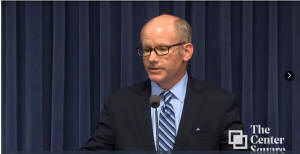Future of sweeping energy legislation uncertain after another stall
 Send a link to a friend
Send a link to a friend
 [September 02, 2021]
By Greg Bishop [September 02, 2021]
By Greg Bishop
(The Center Square) – The Illinois Senate
President hopes to pass changes to the state’s energy policies for the
next quarter of a century before any “deadlines are fatally tripped.”
From investing in wind and solar projects to subsidizing nuclear plants,
the Illinois Senate passed a bill that would affect all areas of the
state’s energy policy.
After a special session on revising the legislative maps Democrats
passed, Senate President Don Harmon, D-Oak Park, Wednesday morning said
they decided to move Senate Bill 18 as a deadline from Exelon to close
some of its nuclear fleet looms. He thought it was Aug. 31.
“And that’s part of the reason we came back to Springfield when we did,”
Harmon said. “The governor’s office has shared with us that they believe
it's more like the 12th and 13th of the month. I hope they’re right, but
I don’t want to be testing the boundaries of that deadline.”
He said he’s glad they passed what they did, when they did, with enough
time for the House to take it up and revise it if needed before “any of
the deadlines are fatally tripped.”

Exelon hasn't given a date for the closure of some of its nuclear fleet,
but a shutdown checklist indicates there are about 18% of the necessary
decommissioning tasks remaining for it’s Byron and Dresden facilities.
Some remaining tasks include workforce reductions and the plants being
taken offline permanently.
The legislation the Senate passed does a myriad of things, including
propping up nuclear power with ratepayer subsidies and subsidizing
renewable energy job training. With a nuclear plant in his district,
state Sen. Neil Anderson, R-Andalusia, supported the measure, but warned
against further subsidizing renewable energy.
“You want lower costs to the ratepayers, even cut their current costs?
Stop subsidizing weak and inefficient power,” Anderson said. “We could
build more nuclear plants without subsidies.”
Anderson said the narrative has changed over the
years from pushing for “clean” energy to “renewable” energy and said
lawmakers will be back to the same issue in two to four years if they
continue to make an uneven playing field for power providers.
[to top of second column]
|

Separately, Illinois Senate President Don Harmon, D-Oak Park, state
Sen. Neil Anderson, R-Andalusia, Prairies State Vice President of
External Affairs Alyssa Harre and CWLP Chief Engineer Doug Brown
talk about energy policy

Among other changes, the measure would also force the closure of
private coal fired power plants by 2030 and public coal plants by
2045.
Alyssa Harre, with Prairie State in southern Illinois, said that
would impact the not-for-profit utility’s 2.5 million ratepayers.
“They did take out bonds to essentially mortgage and build this
facility and regardless if the plant is operating or not, those
payments will still need to be made,” Harre said.
City Water Light and Power in Springfield wouldn't have extended
bonds to pay off past 2045. But, CWLP’s Doug Brown worried about the
impacts of greenhouse gas caps getting progressively more strict.
“That basically limits the operation of the utility in trying to
really provide for a reliable grid as well as keeping our costs
controlled for our customers,” Brown said.
The measure has yet to be sent to the House, where spokesperson for
House Speaker Emanuel “Chris” Welch, D-Hillside, said Welch relying
on the advice and guidance from his leadership team as conversations
continue.
“The Speaker has been very clear that before an energy proposal is
called in the House there must be a consensus among the Democratic
caucus and stakeholders, as well as include strong, meaningful
ethics provisions,” the spokesperson aid.

[© 2021 Thomson Reuters. All rights
reserved.] Copyright 2021 Reuters. All rights reserved. This material may not be published,
broadcast, rewritten or redistributed.
Thompson Reuters is solely responsible for this content. |